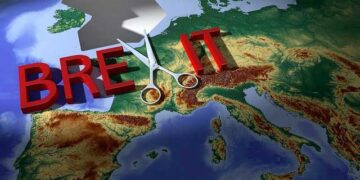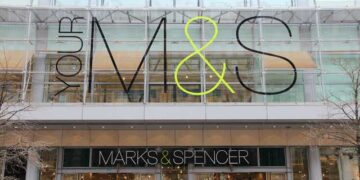In the light of new post-Brexit rules, Britain’s leading grocery organisations called for “urgent intervention” to avert significant damage to Northern Ireland’s food supply, although shoppers in one of Europe’s major supermarkets have already recorded empty shelves for several days.
Britain can no longer be part of the Common Market and Customs Union of the European Union, but Northern Ireland, as part of the customs territory of the United Kingdom, is connected to both nations, though still affiliated with the Single Market for Products of the EU.
- Secretary Brandon Lewis of Northern Ireland has said any vacant shelves in the North are due to coronavirus problems and not because of Brexit.
- He told Sky News: “The flow of food and goods linked to the EU and to the Protocol of Northern Ireland has actually been good.”
- Where we see some pictures of empty shelves in Northern Ireland, while we’ve seen them lately across the UK, has been related to Covid and some of the problems we had at Dover because of Covid just before Christmas and the movement through that rather than through the protocol’s supply line.
Under the Northern Irish Protocol, which governs post-Brexit trade between Britain and Northern Ireland, there is a three-month grace period for supermarkets trading in the territory to adjust their supply chains to the current economic reality.
However, in some stores in Northern Ireland since the turn of the year, fresh food products have typically been imported from the mainland, since they were struggling to change to new procedures.
Large retailers such as Tesco, Sainsbury’s, Asda and Marks & Spencer wrote to Michael Gove warning of the deterioration of supplies.
- Ian Wright, chief executive of the Food and Drink Federation of Britain, told a committee of lawmakers that in terms of food preference, Northern Ireland was at risk of moving from “color TV to black and white.”
In the communication, it was suggested that the long-term approach negotiated with the EU was necessary until the grace period for streamlined controls expires on 31 March.
All retailers have invested significantly in the last few months to avoid disruption, but that will become inevitable if the proposals governing movement of food from Great Britain to Northern Ireland are adopted, was the core of the message.
“We recognise the European Commission needs to see increased compliance to support the concessions it granted through the Northern Ireland protocol, but the current proposals, increased bureaucracy and certification in such a short timescale are unworkable.”
- The general manager of the Freight Transport Association of Ireland (FTAI), Aidan Flynn, wrote to Micheál Martin to warn him of supply difficulties, work cuts and rising costs.
The CEOs’ called on Gove to form a special working group to manage the integration of customs and food regulations by government departments.
Gove said that a dedicated team had been formed and was trying to find a solution.
- Elsewhere in the UK, the consequences of Brexit are still being felt. In particular, the availability of fresh fruit and vegetables is proving troublesome, leading to more empty shelves. This was also the case at Sainsbury’s Cambridge and Suffolk branches last week, the Daily Mail reports.
Boris Johnson said that trade between Britain and Northern Ireland had “teething problems” but that commodities were flowing smoothly and in regular quantities.
But I can confirm… that if there are issues that we consider are disproportionate, we would not hesitate to invoke Article 16.
- Brexit, meanwhile, is felt in Belgium as well. Last weekend, several Belgian stores sold out of fresh salmon. Some of the salmon come from Scotland, and because of Brexit red tape at ports, it takes much longer to be distributed from 1 January.
The shortages faced in Northern Ireland are part of the trade turmoil that has been increasingly visible following the finalisation of Britain’s Brexit divorce on December 31.
Many British firms are soon finding that, after the breakthrough Brexit free trade agreement clinched over Christmas, they must now pay duty on goods destined for the EU.
This is because all products crossing borders are subject to the so-called “rules of origin” condition, which ensures that every product will be subject to a customs tax if it comes from abroad in Britain and is then shipped back into the EU.
- Larger retailers tend to be struck the hardest by the hold ups, less concerns have been identified by the smaller locally run stores, as they rely more on local vendors.
As about 95 percent of their stock is locally sourced, Shane Stewart from Stewart’s Butchers said they had spared the worst of it. However, he has noticed some challenges, as they import some niche goods.
Despite Johnson’s pledge of a ‘tariff-free’ deal, British firms face tariffs
Last week, high-street supermarket giant Marks & Spencer (M&S) cautioned that the trade arrangement would have a ‘huge effect’ on industry in the Czech Republic, Ireland and France, adding that the rules of origin could affect about 2,000 of its food items.
M&S has failed to rebuild shelves of its EU stores following Britain’s departure from the single market and has also briefly closed some of its outlets, with shoppers turning to Twitter to lament the shortages of ready-made dinners, curry boxes and cheddar cheese.
- In spite of a possible no-deal situation, sources said stockpiling had taken place well before Christmas for several items.
As Steve Rowe, chief executive of the group, said it: “When you read the fine print, Tariff-free does not feel like tariff-free.”
Since January 1, complaining about red tape and extra levies, other firms have run into similar trouble.
“At least 50 of our members face potential tariffs for re-exporting goods to the EU,” said William Bain, AFP’s trade policy analyst at the British Retail Consortium.
We are collaborating with members on short-term alternatives and are pursuing consultation on longer-term measures to reduce the impact of new tariffs with the [UK] government and the EU,”We are working with members on short-term options and are seeking dialogue with the [UK] government and the EU on longer-term solutions to mitigate the effects of new tariffs,”
- This ensures that with each source and type of goods being transported within their trailer, hauliers need to arrive at the ferry docks with complicated customs declarations. This does not happen very much, causing many manufacturers and freight carriers to reduce their Northern Ireland-bound loads and simplify them.












